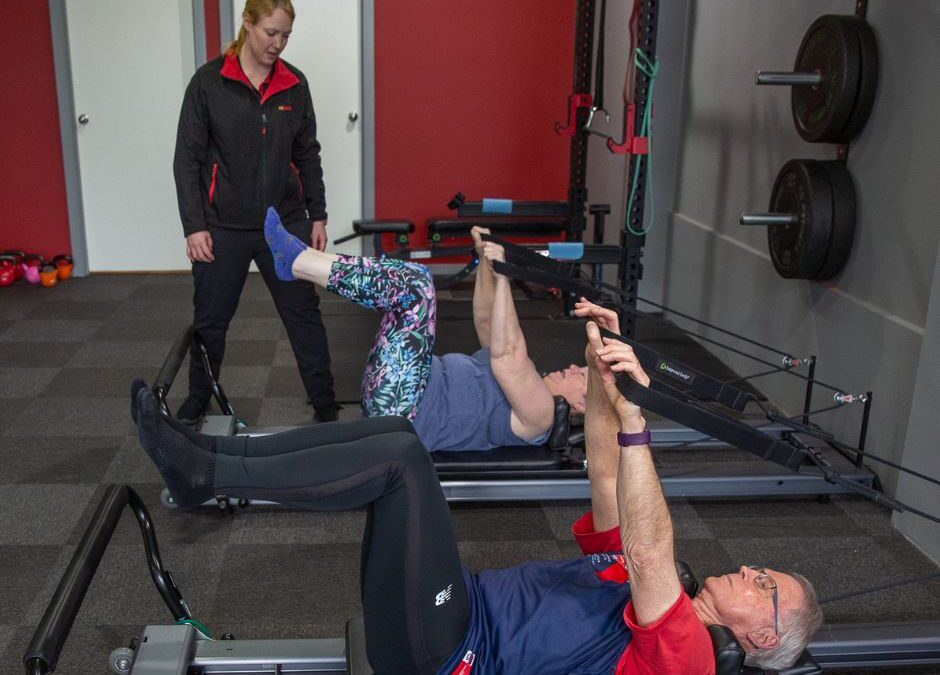With over two decades of experience teaching Clinical Pilates, I once believed that Reformer Pilates alone could sufficiently build muscle strength. However, many clients struggled to utilise the Pilates reformer at its highest spring levels. This indicated room for improvement in strength gains.
Over time, it became evident that while Pilates delivered results and improved lives, clients often hit a plateau where further gains were challenging to achieve.
Why? Let’s explore this question and discover how you can break through this performance ceiling.
Pilates is great for building strength – but here’s where it falls short
Pilates, especially Reformer Pilates, is a resistance-based exercise program. This means exercises progressively increase muscle and joint load, stimulating muscle growth and adaptation. To grow muscles, they must be pushed beyond their previous comfort zones. This forces the nervous system and connective tissues to adapt and strengthen—a fundamental principle shared across strength-based exercises.
The resistance in Reformer Pilates exercises is adjusted by modifying spring combinations and body positions on the reformer. For example, during a Scooter exercise, adding more or heavier springs or adjusting body positioning by moving the foot further from the footbar challenges the gluteus maximus muscle from a more extended and weaker position, enhancing muscle development.
However, the Pilates reformer has limitations due to its fixed number and weight of springs. As a result, gains may plateau over time, necessitating progression to classical strength training exercises, which offer greater resistance. Mat-based Pilates, relying primarily on bodyweight and light weights, may reach this plateau even faster.
Pilates excels in building foundational muscles for joint stability
The best role of Pilates, especially Reformer Pilates, is to work on the stabilising muscle groups. This is not limited to “core stabilisers,” the abdominal muscles, but includes all muscles required for stability. This includes, but is not limited to:
- Gluteal muscle groups: Gluteus maximus, medius, and minimus. These muscles help provide stability around the lumbar spine and pelvis.
- Hip rotators: Muscles such as quadratus femoris and the internal rotators of the hip provide rotational control of the hips and limit impingement, common in soccer, football, and hockey.
- Shoulder blade stabilisers: By working on your shoulder blade stabilisers, this provides a great base for good posture of the upper body and the rotator cuff muscles of the shoulder to do their best work.
By enhancing joint stability, Pilates minimises joint wear and tear during movement. This creates a solid foundation for primary muscles to function effectively without restriction.
The combination of pilates and classical strength works best for building strength
Pilates lays the groundwork by enhancing initial strength and joint stability. Classical strength training, incorporating compound lifts like deadlifts, squats, and bench presses, then builds upon this foundation.
I have seen clients transitioning from Pilates to compound lifting typically experiencing improved strength gains. They have better control, reduced injury risk, and enhanced technique.
Want to do both? here’s our expert advice!
Depending on your fitness level, a structured Pilates program spanning seven weeks before embarking on classical strength training can yield significant and sustainable results. This approach not only enhances immediate gains but also supports long-term fitness objectives.
Do you have any questions?
- Call us on (03) 9857 0644 or (07) 3505 1494 (Paddington)
- Email us at admin@mdhealth.com.au
- Check out our other blog posts here
Our clinical staff would be happy to have chat if you have any questions.
Take the first step to a healthier you!
Would you prefer for someone to contact you regarding booking your Initial Physiotherapy appointment, Initial Exercise Physiology, Initial Osteopathy session or FREE Full Body Assessment*?
Or do you have any other enquiry about our services at MD Health?
Please fill in this form and someone from MD Health will be in touch with you soon.
Alternatively please call us on 03 9857 0644 (Kew East), 03 9842 6696 (Templestowe), 03 8683 9442 (Carlton North) or 07 3505 1494 (Paddington) to book now!
For all new clients who wish to come in for a one-off, casual or adhoc basis for Physiotherapy or Exercise Physiology the Initial Physiotherapy or Initial Exercise Physiology appointment is a paid service.
** The 13 Week Clinical Pilates Program at MD Health is not a lock in contract and you are not required to attend for the full 13 weeks if you do not wish.
Get In Touch



